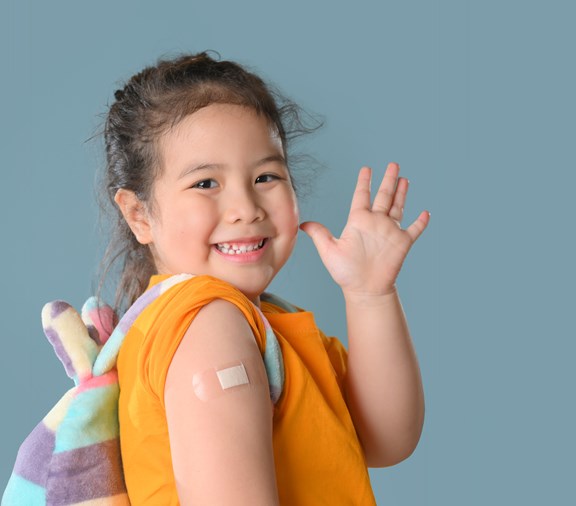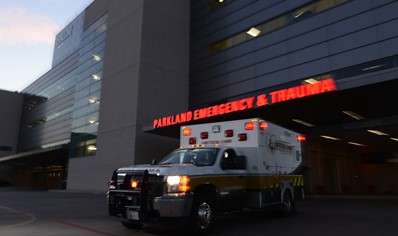
Keep Your Child Safe with These Important Vaccines
April 18, 2025
In Texas, babies and children are encouraged to get several different vaccines to help protect them from serious disease. These vaccines are safe, effective ways to help your child stay healthy.
See below for a list of common vaccines your child may receive. Ask your child’s primary care provider (PCP) for a record when they get their shots. If you have questions or concerns, be sure to talk to your PCP.
COVID-19 vaccine
Protects against: COVID-19, a contagious respiratory illness.
Recommended for: Everyone 6 months and older.
Number of doses: Varies depending on brand.
Diphtheria, Tetanus, and Acellular Pertussis vaccine (DTaP, Tdap, or Td)
Protects against: Diphtheria (a serious bacterial disease), tetanus (lockjaw), and pertussis (whooping cough).
- Children younger than 7 years old should get three shots of DTaP (at 2, 4, and 6 months old), plus two booster shots (at 15-18 months and 4-6 years).
- Preteens should get one shot of Tdap at age 11-12 to boost their immunity. They should then receive one dose of Tdap or Td every 10 years to stay protected as adults.
Haemophilus influenzae Type b (Hib) vaccine
Protects against: Serious bacterial illness that can cause conditions like pneumonia (lung infection) and meningitis (swelling of the lining of the brain and spinal cord).
Recommended for: all children younger than 5 years.
Number of doses: 3-4 doses depending on brand (doses start at 2 months and are usually completed by 15 months).
Hepatitis A vaccine
Protects against: Hepatitis A, a contagious liver infection that causes yellow skin and eyes (jaundice).
Recommended for: Age 12 months and age 18 months.
Number of doses: 2 (at least 6 months apart).
Hepatitis B vaccine
Protects against: Hepatitis B, a virus that causes liver disease and can lead to cancer of the liver.
Recommended for: All infants; any children younger than 19 years who have not been vaccinated.
Number of doses: 2-3, depending on vaccine brand.
HPV vaccine
Protects against: Human papillomavirus (HPV) infections that can cause some cancers later in life.
Recommended for: Children age 9-12.
Number of doses: 2 (6-12 months apart).
Influenza (flu) vaccine
Protects against: Influenza, a contagious respiratory illness.
Recommended for: Everyone 6 months and older.
Number of doses: 1 per year (flu vaccines are usually available starting in the fall).
Measles, Mumps, and Rubella (MMR) vaccine
Protects against: Measles (a virus that can affect the lungs, brain, and immune system), mumps (a virus that infects the saliva glands but can also infect the testicles, ovaries, and brain), and rubella (also known as German measles; can cause serious birth defects).
Recommended for: Children starting at age 12 months.
Number of doses: 2 (first dose at 12-15 months; second dose at 4-6 years old).
Meningococcal vaccine
Protects against: Bacteria that can cause meningitis (swelling of the lining of the brain and spinal cord) and bloodstream infections (which can cause bleeding in the skin and organs).
Recommended for: all kids and teens age 11 and older.
Number of doses: 1.
Pneumococcal conjugate vaccine (PCV)
Protects against: Bacterial illnesses that can affect the ears, lungs, blood, and brain.
Recommended for: all children younger than 5.
Number of doses: 4 (at 2 months, 4 months, 6 months, and 12-15 months).
Polio vaccine
Protects against: Polio, a serious disease that can attack the nervous system and cause paralysis.
Recommended for: Children; adults who have never been vaccinated against polio.
Number of doses: 4 (at 2 months, 4 months, 6-18 months, and 4-6 years).
Respiratory syncytial virus (RSV) vaccine
Protects against: A contagious respiratory virus; infants and older adults are at highest risk for severe illness.
Recommended for: infants whose mother did not receive the RSV vaccine during pregnancy (also recommended for adults age 75 and older).
Number of doses: 1.
Rotavirus vaccine
Protects against: Rotavirus, which can cause severe diarrhea and vomiting.
Recommended for: Infants and young children.
Number of doses: 2 or 3 (given as drops rather than shots), depending on which version of the vaccine is given. Your child should get their first dose before they turn 15 weeks old and their last dose before they turn 8 months old.
Varicella (chickenpox) vaccine
Protects against: Chickenpox, a virus that causes itchy blisters all over the body and can also cause serious birth defects.
Recommended for: People 12 months or older.
Number of doses: 2 (first dose at 12-15 months; second dose at 4-6 years old).



